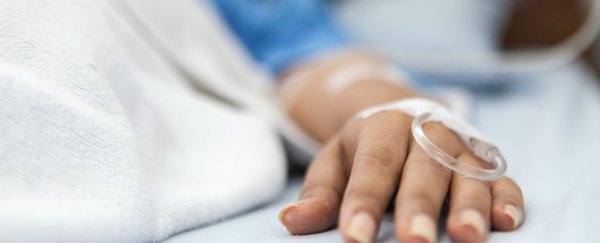In a controversial move, a US biotechnology company has been given permission to recruit 20 clinically dead patients and try to bring their central nervous system back to life.
If they can successfully reanimate parts of the upper spinal cord, where the lower brain stem is located, there's a possibility that they could kickstart vital body functions such as breathing and heartbeats - something these patients can only do with the help of machines.
"This represents the first trial of its kind and another step towards the eventual reversal of death in our lifetime," CEO of Bioquark Inc., Ira Pastor, told Sarah Knapton at The Telegraph.
The Bioquark team, which together with Indian biotech company Revita lifesciences, was granted permission from an institutional review board at the US and Indian national institutes of health to begin clinical trials whenever they're ready. Biquark says it plans to start recruiting patients for its so-called ReAnima Project immediately.
The phase 1 trial is described as a non-randomised, proof-of-concept study to determine whether they can reverse brain death using a combination of techniques, including drug administration, nerve stimulation, and laser therapy.
That's the best-case scenario - failing actual reanimation of the central nervous system, the team will be investigating if they can affect any changes in the meninges of the brain - layers of tissue that sit between the skull and the surface of the brain.
In particular, the team will be looking for improvements in the patients' pulse, blood oxygen saturation, blood pressure, and respiration.
Once they've been granted permission from the families, the researchers will treat their 20 clinically dead patients over a six-week period in Anupam Hospital in Rudrapur, India. After this, they will be monitored for several months to see if any changes have occurred.
"We hope to see results within the first two to three months," Pastor told The Telegraph.
So how exactly does Bioquark intend to bring back the dead? The team will be administering four different types of treatments:
- Injecting peptides (simple protein chains) into the spinal cord on a daily basis.
- Injecting stem cells into the brain twice weekly.
- Transcranial laser therapy, a non-invasive treatment that uses light to penetrate the skull to activate the body's natural recovery processes, and has been tested on stroke, migraine, and Parkinson's patients in the past.
- Nerve stimulation - another non-invasive technique that involves delivering electrical impulses to the median nerve of the upper limb.
"To undertake such a complex initiative, we are combining biologic regenerative medicine tools with other existing medical devices typically used for stimulation of the central nervous system, in patients with other severe disorders of consciousness," says Pastor.
The researchers will test whether this combination of treatments can help kickstart the cell regeneration process in their 20 recruits, with Knapton comparing it to how salamander and newt cells are able to automatically regenerate new tissue and muscle cells to regrow entire limbs.
To be clear, 'brain dead' or clinically dead patients are kept alive only through the work of life support machines, which means they cannot breathe or often circulate blood on their own, and their brains have completely shut down all functioning.
Many do retain certain vital functions though, such as processing waste, digesting nutrients, healing wounds, growing and maturing - some can even fight off infections and gestate a baby. If we can figure out how how to get their brains working again, there is hope that they could regain some semblance of life.
But let's not get too ahead of ourselves here, because we've got a long road ahead of us - and that's if this trial sees any positive results at all. For now, the researchers are taking it one step at a time.
"It is a long-term vision of ours that a full recovery in such patients is a possibility, although that is not the focus of this first study - but it is a bridge to that eventuality," Pastor told Knapton at The Telegraph.
"Through our study, we will gain unique insights into the state of human brain death, which will have important connections to future therapeutic development for other severe disorders of consciousness, such as coma, and the vegetative and minimally conscious states, as well as a range of degenerative CNS conditions, including Alzheimer's and Parkinson's disease," added founder and president of Bioquark Inc., Sergei Paylian.
At this stage, we should treat this as a really, really, really long shot, but science has a way of surprising us, so we'll just have to wait and see what happens.
The trial outline can be accessed here.
